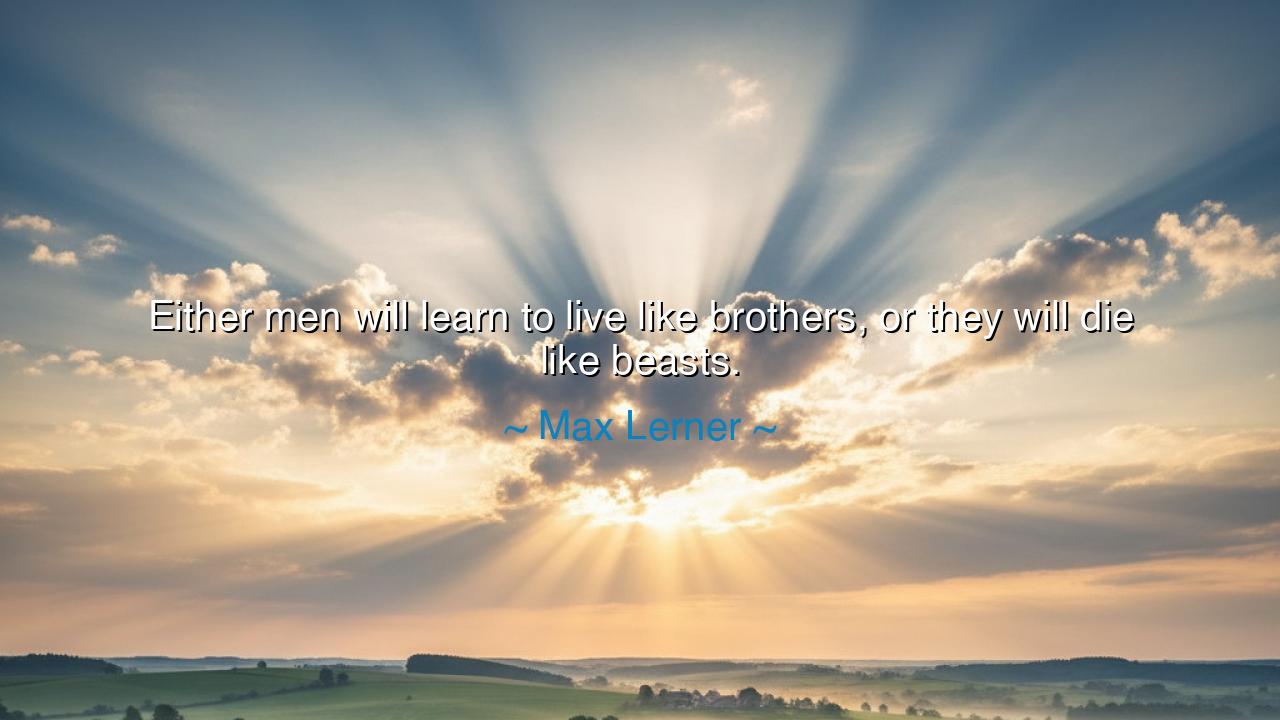
Either men will learn to live like brothers, or they will die






Hear, O children of tomorrow, the voice of Max Lerner, who looked upon the turmoil of nations and spoke with the clarity of thunder: “Either men will learn to live like brothers, or they will die like beasts.” These words are not gentle musings but a solemn warning, forged in the fire of human conflict. They carry the weight of history’s sorrow and the urgency of a choice that still confronts us: unity or destruction, brotherhood or barbarism.
The meaning is both simple and profound. To “live like brothers” is to recognize in every man and woman the reflection of oneself, to honor their dignity, to share in their struggles, and to protect their lives as though they were one’s own. To “die like beasts” is to descend into hatred, to let fear and greed divide us until we tear each other apart. Lerner, who wrote in the shadow of world wars and the rise of nuclear weapons, understood that humanity’s survival depends not on walls or weapons, but on the ability to embrace one another as kin.
History cries out with proof of this truth. Consider the carnage of the First World War, where millions of men, divided by flags and orders, slaughtered one another in trenches of mud and blood. They did not know each other’s names, yet they killed as if the other were less than human. Beasts devour without reason, and in that war, men did the same. Yet amidst the horror, there was a glimpse of brotherhood: the Christmas Truce of 1914, when soldiers from opposing sides laid down their arms, sang songs together, and exchanged gifts in no man’s land. For a brief moment, they remembered their shared humanity. That moment is the vision Lerner demands we embrace, not for a single night, but for all generations.
Think too of the civil rights movement in America, where voices like Martin Luther King Jr. echoed Lerner’s cry. King declared that “we must learn to live together as brothers or perish together as fools.” It was the same eternal teaching: that hatred and division lead only to ruin, but love and justice lead to survival and flourishing. The struggle for equality was not only about laws but about hearts—about learning to see one another as brothers and sisters, not as strangers or enemies.
The lesson is unmistakable: the destiny of mankind is bound together. No man, no nation, no race can stand alone. If we refuse to learn the ways of brotherhood, the tools of violence we have built—be they swords or guns or weapons of fire—will turn against us, and we shall vanish from the earth not as kings, but as beasts. Yet if we choose brotherhood, we can rise to heights unimagined, building not only nations but civilizations founded on peace.
As for practical action, begin where you stand. Treat those around you with the respect and compassion of kin. Refuse to let hatred fester in your heart, for every spark of hatred adds to the fire that consumes the world. Seek dialogue, not division; extend mercy, not vengeance. In your family, your community, your nation, sow the seeds of unity. For brotherhood begins not in distant halls of power, but in the daily choices of ordinary souls.
Thus, Lerner’s words are not merely warning but prophecy. Either men will learn to live like brothers, or they will die like beasts. The path is ours to choose. Let us not wait for destruction to force our hand. Let us instead embrace the noble path of brotherhood now, so that future generations may look back and bless us, saying: Here were the men and women who chose to live, not as beasts, but as family beneath the one sky of the earth.






AAdministratorAdministrator
Welcome, honored guests. Please leave a comment, we will respond soon